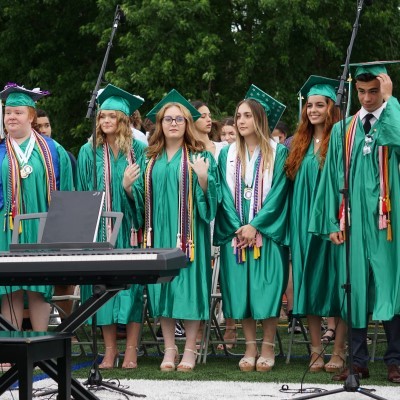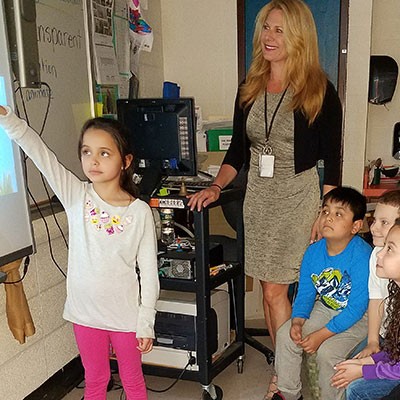Jason Hayes still gets a kick when his students greet him in Walmart with a loud “Hi Mr. Hayes.”
He knows these kids from his corner room at Casimir Pulaski Elementary School where he tutors in-person and distance learners in reading, writing and math.
Hayes understands these students after his own childhood struggles with dyslexia and other learning disabilities nearly drove him away from advanced learning.
“There weren’t too many role models for me,” Hayes said about his early education in Harlem, New York. “I was turned off by school.”
Hayes’ mother became a teacher to assist her son academically, and he returned to college to get a degree in program development for non-profit youth programs. While grant-writing and program development never became his niche, his love of kids continued and he took substitute teaching jobs and coached.
After moving to Meriden with his wife to raise a family, he applied for a job at Casimir Pulaski, where his children attended school. Principal Dan Coffey encouraged him to become a part-time tutor. Hayes soon discovered he wanted more, and while he resisted returning to school, Coffey put him in touch with Lou Bronk, assistant superintendent of personnel and talent development for Meriden Public Schools.
“I was impressed with how up front (Bronk) and Mr. Coffey were about hiring teachers of color, particularly Black men,” Hayes said.
Bronk and Hayes went back and forth about the Relay graduate school for education program, an accelerated initiative designed for college graduates who work in the schools to get their teaching certification. Hayes was aware of the program in Hartford and other cities, but he had his own four children to consider.
“I wanted to be home with my family, so they started the program here,” Hayes said. “I like working with kids and developing programs but as I got into this system, particularly as a Black male, I realized it’s a better way to have a direct impact, especially at this age level.”
Hayes’ firsthand experience with difficulties in the early grades that can turn kids off from school the rest of their lives, underscores the importance of his work. And being Black allowed Hayes to offer a different perspective to students and their families who see him as someone they can relate to.
"Parents say ‘Oh you get what’s going on. I can also be a role model for teaching as a career."
According to the non-profit Edutopia, Black students who had a single Black teacher were 13 percent more likely to enroll in college. With two Black teachers, the percentage jumped to 32 percent, Bronk said.
Spotlight on diversity
The lack of diversity among school faculty was put in the spotlight last year when a group of Platt High School students told educators, city officials and federal lawmakers that in 12 years of public schooling, they had “never seen anyone that looked like me.”
“Having teachers who are representative of our student population can have a significant positive impact on ensuring that all students are college and career ready,” Bronk said in an email. ”Programs like Relay help increase the candidate pool to a certain degree, but we feel these opportunities need to be expanded exponentially to truly attain the outcomes we desire for our students, particularly those that are most disengaged and disenfranchised.”
Meriden Public Schools also wants to promote and champion the teaching profession to young professionals and its own students to increase the pool of teaching candidates.
Of the 8,163 students in the city’s public schools, 830 identify as Black, with 4,636 identifying as Hispanic/Latino and 337 students identifying as two or more races, according to records from the state Department of Education.
But building a teaching staff that matches the student population has proven challenging. School officials are hopeful Relay and other programs will bring more diversity.
Twenty percent of the 56 new hires in Meriden Public Schools this year identified as a race other than white, Bronk said. Last year, 25 percent of new teachers were people of color, raising the overall total to 9.4 percent of the teaching staff. This year, Bronk expects it to rise to 9.6 percent. The state average is 8.7 percent.
Although not quite where it wants to be, the district has made some strides. In 2016-2017, 7.9 percent of the teaching staff reported being people of color, in 2017-2018 that grew to 8.3 percent, in 2018-2019, it rose to 8.6 percent.
“As a district, we feel this progress is too slow ... as our student body becomes more and more diverse each year and we are making only incremental gains,” Bronk stated in an email. “There is a small pool of teachers of color graduating from local universities annually and we are, in effect, actually luring teachers away from other districts to come teach in Meriden.”
Focused and consistent
The work begins by being open and honest with the community about goals, strategies and desired outcomes, Bronk said. Administrators report on district trends in hiring to the Board of Education and the community twice per year. The board set goals to increase diverse hiring and those goals are communicated to the central office and school principals.
“Implementing programs to help achieve these goals is critical, but will only provide significant gains if the district can accomplish results at scale, Bronk said. “We are committed to remain focused and provide consistent efforts.”
The district has other pipelines for building a diverse teaching staff, said Board of Education President Robert Kosienski.
Meriden Public Schools advertises nationally in several minority career trade publications including The National Minority Update, Teachers of Color Magazine, Diversity Employers Magazine and The Equal Opportunity Employment & Education Journal.
It has also continued its work with MPS’s Grow Your Own program for minority staff already working in non-certified positions and working towards a certified teaching degree.
“We have continued to utilize the Meriden Public Schools platform for the Connecticut State Department of Education TEACH CT program, which was developed to assist with teacher recruitment and district programs to increase interest in the field of Education for students,” Kosienski said. “We have also begun to implement the Educators Rising program at our high schools in partnership with the State Department of Education. We are committed to putting the most qualified, caring individuals in our classrooms.”
The Relay program has built-in supports and resident advisors to help teacher candidates eventually lead their own classrooms.
Affinity group
Everyday, Hayes joins fourth-grade teacher Orlando Valentin in the afternoon and shifts from tutor to classroom teacher.
Valentin, who is Puerto Rican, leads the Affinity Group where teachers of color throughout the district come together to talk about adverse situations and share perceptions. The group was formed as a way for teachers to network and feel less isolated, Valentin said.
“I’m very happy to see what Meriden is doing,” Valentin said. “They have the four-year equity initiative on the website. I’m pleased that they were having this discussion before everything (racial tension) was going on in the country. It’s proactive, not reactive.”
Hayes’ involvement as a YMCA coach and basketball player with many of the students’ fathers is also a bonus, Valentin said.
“The big thing is, he coaches basketball, he’s a tall, black gentleman and kids can relate,” Valentine said. “It’s very positive when you think about the messaging. There are some Black people who work in the schools, but not teaching positions. It’s good for all the kids.”
Hayes’ certification this summer will allow him to teach grades K-6 and he has a two-year commitment to stay in Meriden Public Schools.
“I love kids and I love teaching and coaching some basketball,” Hayes said. “We have no plans to leave.”
By Mary Ellen Godin, Record-Journal staff





